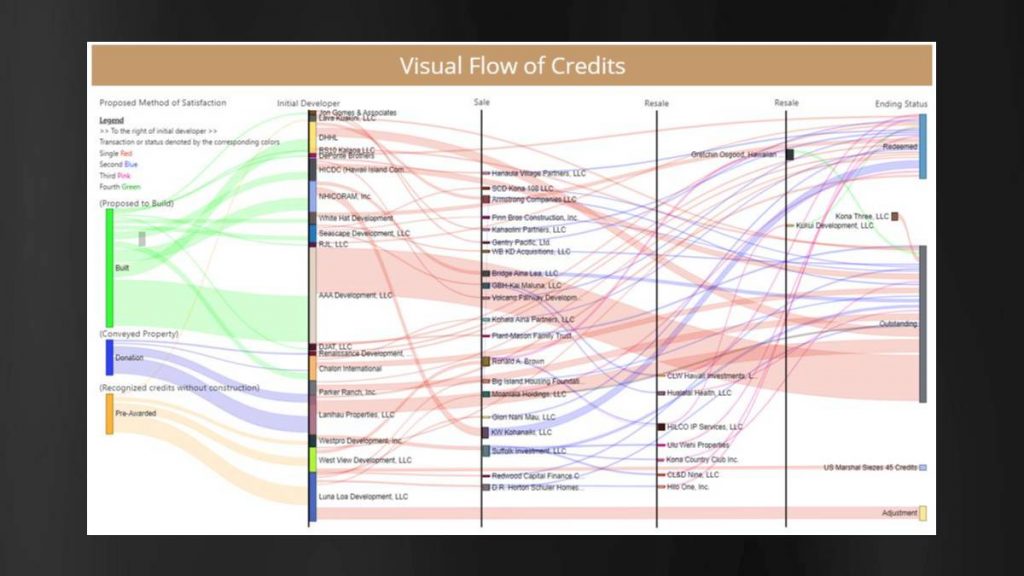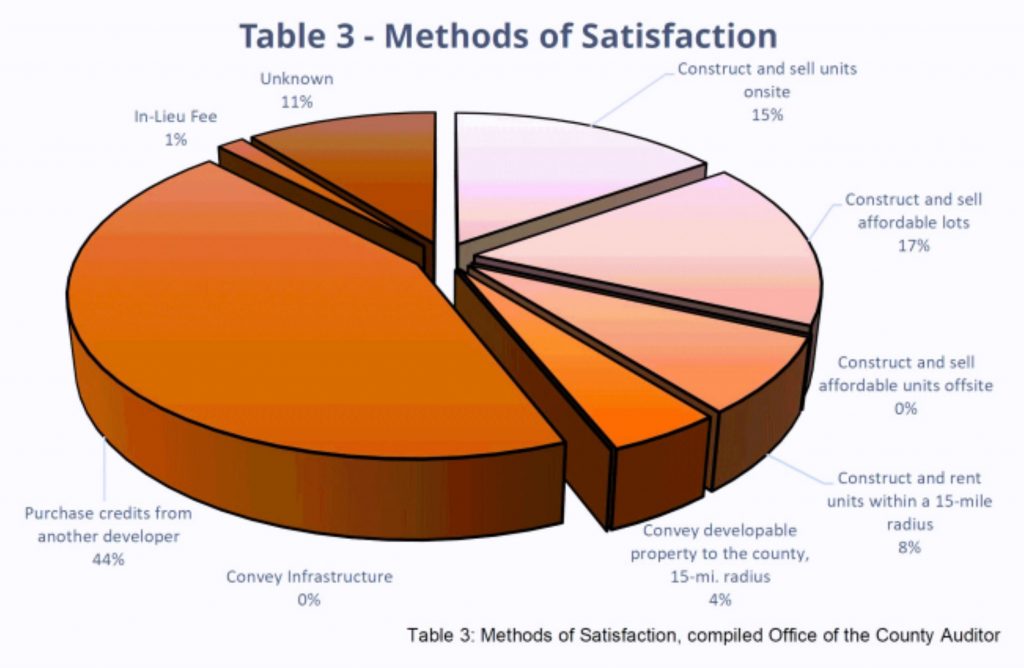Hawaiʻi County’s audit finds most affordable housing credits not resulting in new units

A new Hawaiʻi County audit revealed that of the 1,811 affordable housing credits issued since 1988, only 336 credits have resulted in the intended construction of affordable housing units, Hawai‘i County Auditor Tyler Benner recently told the County Council.
That’s a redemption rate of only 9.87 credits per year. The audit also found that 638, or 35.2 percent of those credits have been sold at least once. Private credit sales can be lucrative to developers, with historical values ranging from $5,000 to as much as $75,000 each.
“When used as intended, credits provide developers with a means to liquidity, which in turn contributes to housing production,” the auditor’s report says. “However, when bought and held, the lack of liquidity means less overall capital investing in developments, and production suffers.”
There is currently an outstanding balance of 1,354.2 affordable housing credits, according to the audit of the Office of Housing and Community Development’s affordable housing credits program, which was conducted from September 2022 to January 2023 and published Feb. 1.
The slow development of affordable housing comes at a time when Hawai’i Island is in the midst of a “severe housing crisis,” which has led to many residents leaving the state, according to the audit.
Last fall, the County Council requested the audit, which took a deep dive into the affordable housing credits program. It evaluated whether the internal controls of the housing agency’s planning branch were adequate to ensure efficient issuance and use of those credits.

Under County law, specifically Chapter 11 which deals with housing, developers have several options to satisfy their affordable housing obligation:
- Developing finished lots.
- Selling or renting required units on or off-site.
- Conveying (transferring ownership) land or infrastructure.
- Purchasing affordable housing credits.
At approximately 44 percent, purchasing has become the most often used method of satisfaction. The credits also can be transferred to other developers.

Concerns about affordable housing development in the county have been expressed for decades, but the audit request came about following a corruption case involving a former employee of the housing agency, Alan Rudo, and his co-conspirators. Rudo was charged with fraud and pleaded guilty after taking nearly $2 million in bribery or kickbacks for approved specific affordable housing projects. (Policy and procedures were subsequently developed in response to this event, according to the audit.)
“While theft and loss can and do happen, the ability to conceal and deceive for a long time is symptomatic of inadequate internal controls,” the audit said. “Decades of neglect in monitoring the program has left the department unable to evaluate its success.”

The audit results showed where the program has deficiencies and how it has underserved communities around the Big Island.
“Excess credits are bought and held for long periods rather than used to produce housing units,” the report continues. “For [the Office of Housing and Community Development] to successfully achieve its mission of providing affordable housing, foundational reforms must accompany improvements to its internal control system.”
The report discusses deficiencies at length, but more importantly offers several recommendations the auditor says will ensure the program’s performance matches up with what it is expected to do when they are implemented.
The recommendations:
- Clarify County code: The Office of Housing and Community Development should work with the County Council to revise applicable sections of Chapter 11.
- Establish administrative rules: The housing agency should establish administrative rules to effectively administer the County’s affordable housing police.
- Update and enforce polices and procedures: Policies and procedures at the housing office should be clarified and then enforced to ensure consistency and industry best practices are used.
- Increase monitoring and program oversight: Not only should ongoing monitoring of the agency’s internal control system’s design and operating effectiveness be implemented, the auditor also recommends that software and technology should be used to improve the management of affordable housing agreements and credits.
- Segregate incompatible duties: One individual should not oversee key elements of the affordable housing process.
- Provide training: Ongoing internal control training should be provided for employees involved in the affordable housing process.
“It’s important to understand that we’re looking between multiple timelines,” Benner told the Council. “The known deficiencies that existed in the past, the improvements that have brought the processes forward into the current environment and the items that still need to be achieved in order to ensure expectations align with actual controls.”
The auditor’s office poured over documents, including policies and procedures, ordinances, affordable housing agreements, electronic and hard-copy developer files and spreadsheets of data; reviewed compliance with all applicable laws, including Chapter 11; looked at similar laws on neighbor islands; and conducted site visits and employee interviews at the housing agency’s offices in Hilo and Kona.
In her response to the audit report, County Housing Administrator Susan Kunz said her office is generally in agreement with the auditor’s conclusions and recommendations. She told the Council that work is already underway to implement the audit’s recommendations, especially on policies and procedures. She said that is particularly important because of the County’s push for more affordable housing.
The housing agency is working with a consultant now, with a report expected to come within the next couple of months. Changes to Chapter 11 also are anticipated, and Kunz said she and her department will work with the Council to make revisions that reflect the recommendations of the consultant and audit report.
Benner gave his report during a March 7 meeting of the Council’s Communications, Reports and Council Oversight Committee.
The auditor’s office will continue to monitor the status of the recommendations laid out in the audit. To view the status, click here.
To read the entire audit report, click here. To watch Benner’s debriefing to the Council, click here.

















